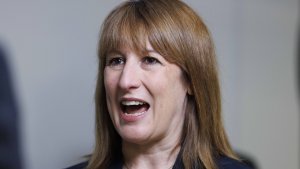Top Economists Urge Chancellor Rachel Reeves To Scrap Fiscal Rules And Boost Public Investment
With rising public demand for improved infrastructure and services, many are watching closely to see how Reeves will balance short-term fiscal challenges with the long-term needs of the UK economy.
With rising public demand for improved infrastructure and services, many are watching closely to see how Reeves will balance short-term fiscal challenges with the long-term needs of the UK economy.
Top Economists Urge Chancellor Rachel Reeves To Scrap Fiscal Rules And Boost Public Investment
With rising public demand for improved infrastructure and services, many are watching closely to see how Reeves will balance short-term fiscal challenges with the long-term needs of the UK economy.

A group of prominent economists is urging Chancellor Rachel Reeves to overhaul the UK's fiscal rules in next month’s budget to allow increased borrowing for vital public infrastructure investments.
In an open letter, the economists warn that years of under-investment have trapped the UK in a “vicious circle of stagnation and decline,” harming the economy and exacerbating social and environmental challenges.
The group fears Reeves may continue the "mistakes of the past" by adhering to spending plans established by the previous government, which include significant real-term cuts in public investment throughout the current parliamentary term.
They argue these cuts would hinder Reeves' ambitions for a "decade of national renewal."
“We do not see how the planned 'decade of national renewal' can take place if these cuts are delivered,” the letter states. “To follow through on these plans would be to repeat the mistakes of the past, where investment cuts made in the name of fiscal prudence have damaged the foundations of the economy and undermined the UK’s long-term fiscal sustainability.”
The letter is signed by a group of high-profile figures, including former Cabinet Secretary Lord Gus O’Donnell, former Treasury Commercial Secretary Lord Jim O’Neill, Professor Mariana Mazzucato of University College London, Mohamed El-Erian, former CEO of Pimco, and several other leading academics from top institutions such as Oxford and King’s College London.
Their main concern centers on the UK’s current debt rules, which they say create an “inbuilt bias” against investment. These rules force ministers to demonstrate that national debt will fall as a share of GDP within five years.
The economists argue for a more flexible approach that considers the long-term benefits of increased public investment.
“A more responsible approach, which better reflects the significant long-term benefits of increased public investment, will require changes to our fiscal rules and to the mandate for the Office for Budget Responsibility,” the letter explains.
Reeves, in her March Mais Lecture, stated that the government can only borrow for capital projects, not for day-to-day spending. She positioned this approach as a shift from short-termism, highlighting the importance of public investment.
However, the Chancellor faces mounting pressure as the October budget approaches, with plans to raise taxes, cut spending, and address a £22bn overspend by Whitehall departments.
The economists argue that cuts to investment, especially in infrastructure, must be avoided at all costs. They emphasize that the government’s goal of economic renewal is only achievable through increased public investment, which will also ensure long-term fiscal sustainability.
“In the upcoming Budget, it is essential that the government recognises the important role that public investment must play in the decade of national renewal,” they wrote.
“Further cuts to public investment must be avoided, a strategy for substantially increasing public investment adopted, and a process initiated to implement a pro-investment fiscal framework.”
As Reeves prepares for a critical budget, the economists' call for more borrowing and investment places further pressure on the government to rethink its fiscal approach.
With rising public demand for improved infrastructure and services, many are watching closely to see how Reeves will balance short-term fiscal challenges with the long-term needs of the UK economy.
Thanks for signing up to Minutehack alerts.
Brilliant editorials heading your way soon.
Okay, Thanks!

